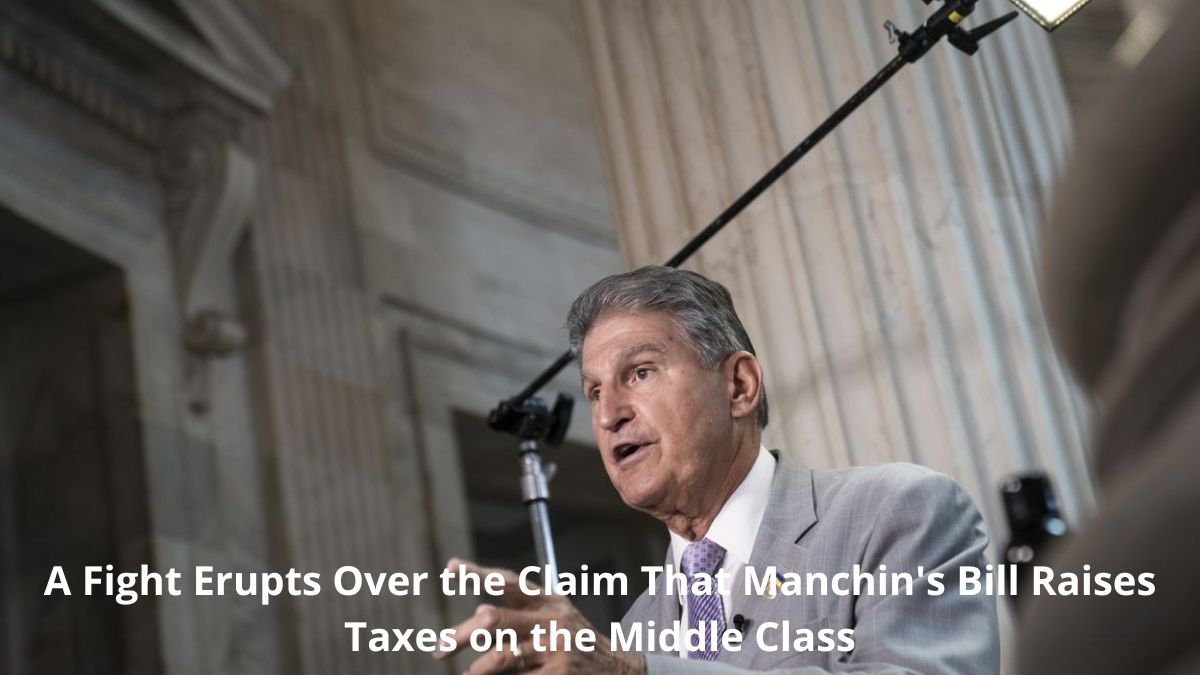A Fight Erupts Over the Claim That Manchin’s Bill Raises Taxes on the Middle Class
The Democratic Party faces challenges in the upcoming midterm elections as a result of a messaging war that has broken out over a US government report that found that everyone, not just the wealthy, would be subject to higher taxes as a result of the Democrats’ latest economic agenda.
According to the Joint Committee on Taxation, the official congressional scorekeeper, the bill negotiated by Senate Majority Leader Chuck Schumer and Senator Joe Manchin could result in an additional $16.7 billion in taxes for middle- and low-income households in the coming year.
Must read-
- Senator Joe Manchin Unexpectedly Supports Biden’s Environment and Tax Proposals
- Democrats Brace for Rewrite Biden Spending Plan to Woo Joe Manchin
That seems to go against President Joe Biden’s repeated pledges to keep taxes flat for households with incomes under $400,000. It also makes it difficult for Democrats to sell their plan’s benefits, which range from investments in clean energy and climate change mitigation to new health care laws.
The JCT’s estimates, which were made at the request of Republicans on the panel and released by GOP staff on Friday, were met with skepticism from seasoned budget watchers. They pointed out that many low-income households’ benefits are not factored into the calculations.
Joe Manchin’s Bill Erupts a Fight
According to Marc Goldwein, senior vice president at the Committee for a Responsible Federal Budget, a Washington, DC think tank, “once you account for the spending side and the other taxes that are left out — and that includes the household consumer tax credits for various energy things, lower drug prices, and health-care subsidies — the middle class is going to be distributionally ahead.”
Two major tax increase proposals are part of the negotiating package: a 15 percent minimum tax on the profits corporations report on their financial statements (the so-called book tax) and a reduction of the “carried interest” tax break used by private-equity managers.
The JCT has determined, through the application of economic theory and tax modeling, that the book tax has a regressive effect on the middle class and low-income earners, despite the fact that the tax does not directly affect them.
For the book tax, Goldwein said, “corporations may be the ones to fill out the paperwork.” Taxes are paid by “people” in the end, though.
A company’s shareholders, including those who hold stocks through pensions or retirement accounts, may be able to get a break on their taxes by having the company reduce dividend payments or some other form of compensation. They could increase prices for consumers or reduce wages for workers.

The JCT model divides the gain 75% to capital, which includes shareholders, and 25% to labor. Based on the panel’s distributional tables, individuals with incomes below $200,000 may see a 1% increase in their tax liability in 2023 due to the passed-through effects of the reduced carried-interest tax break.
The exact way to divide up corporate-tax burdens has been a longstanding debate among economists, William G. Gale, co-director of the left-leaning Urban-Brookings Tax Policy Center, wrote in a blog post on Tuesday.
He wrote that worker contributions in JCT’s model are negligible compared to the costs borne by shareholders. Even though the bill’s primary revenue source is an increase in the corporate tax rate, the JCT distributional tables show tax increases for nearly all income groups.
The Dems’ bill will not fight inflation, no matter what Joe Manchin says. Instead, it’s going to kill jobs by raising taxes on businesses.
And businesses will pass those taxes on to consumers, making inflation worse.
— Tom Cotton (@TomCottonAR) August 1, 2022
Those in favor of the draft took swift action to counter the JCT’s analysis of the bill, which Democratic Party leaders hope to pass this month. Arizona Democrat Senator Kyrsten Sinema has not yet backed the draft, and her support is crucial given the Senate’s 50-50 partisan split.
I hope you found the information presented above to be of use. You can also look through our news section, where we normally cover all of the most recent news and happenings around the world. Visit our website if you’d like to learn more about this topic.

